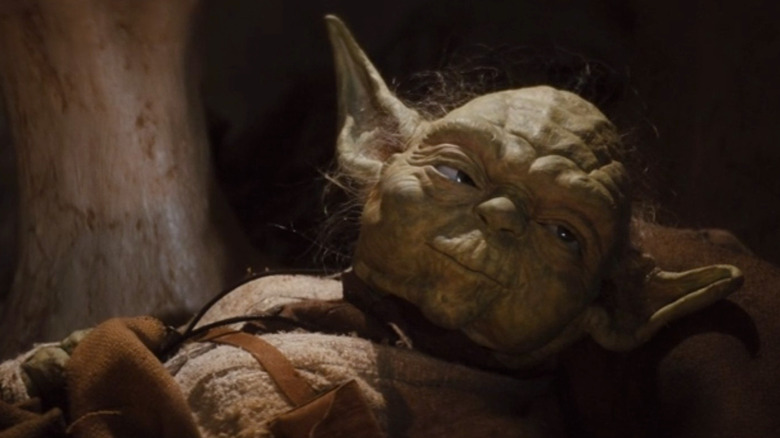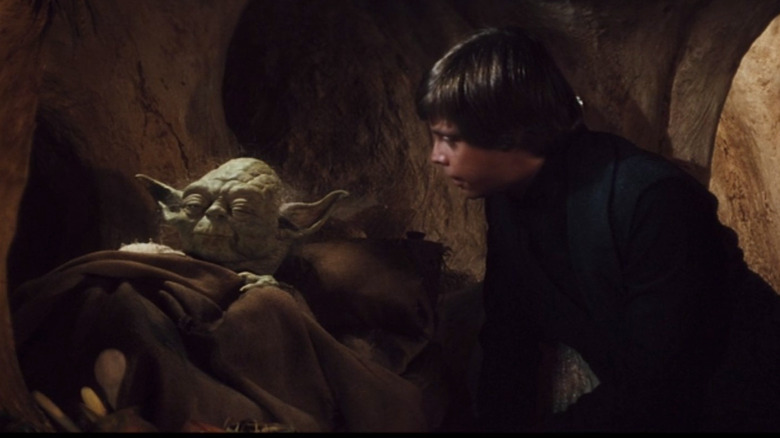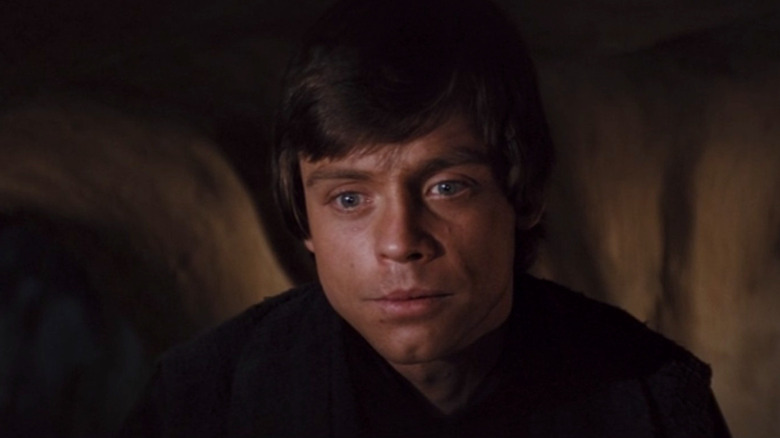Yoda Was Only In Star Wars: Return Of The Jedi Because Of Some Child Psychology Advice
"Do. Or do not. There is no try." We all know that line from Yoda (Frank Oz) in "Star Wars: Episode V — The Empire Strikes Back." I quote it to myself endlessly during long runs. You cannot have "Star Wars" without the wise green Jedi Yoda. He taught Luke Skywalker (Mark Hamill), gave out tons of advice, and has the cutest speech pattern. He is also responsible for little Grogu, a character from the same unnamed-yet-beloved species.
We met Yoda in "Empire Strikes Back" on the swamp planet of Dagobah, where he took over Luke's Jedi training after the death of Obi-Wan Kenobi (Alec Guinness). That might have been the last we saw of him for quite a while, had it not been for child psychologists. As "Star Wars" creator George Lucas revealed on the 2004 DVD release of "Star Wars: Episode VI — Return of the Jedi" (via GamesRadar), he elected to include a scene with Yoda after consulting with these doctors about a certain revelation in "The Empire Strikes Back." You know which one.
'You must confront Vader'
Yoda, it turns out, wasn't originally part of the "Return of the Jedi" script. However, the child psychologists George Lucas consulted were concerned that younger kids might've not believed Darth Vader (David Prowse, voice of James Earl Jones) when he revealed that he was Luke's father in "Empire Strikes Back." It makes sense, with Vader being a villain and Luke being in such a vulnerable situation, hanging on to a pole with his hand cut off. Luke wasn't even sure if he believed it, as evidenced by the scene when he visits Yoda again in "Return of the Jedi."
If you recall, Luke returns to Dagobah for more Jedi training after rescuing Han Solo (Harrison Ford) and Leia (Carrie Fisher) from Jabba the Hutt. He finds Yoda at the end of his life and asks him if Vader was telling the truth. Yoda confirms that Vader is, in fact, Luke's father and that there is another Skywalker out there. (Of course, fans know that this is Leia herself.) Yoda is our hero's trusted teacher and friend, making it easier for children to understand and accept this idea.
Dealing with 'really painful' experiences
I spoke to Dr. Janina Scarlet, clinical psychologist and author of "Unseen, Unheard, Undervalued" and my co-author for chapters in the PsychGeeks book series, including "Star Wars Psychology: Dark Side of the Mind," who spoke about why this was important. Dr. Scarlet explained:
"'Star Wars' explores really complicated topics, including loss, abandonment, betrayal, and trauma. These experiences can be really painful and also confusing to people of all ages. And when trying to make sense of such complicated experiences (even in fiction), it can be helpful to have some clarity through the eyes of a wise and compassionate mentor, like Yoda."
My sometimes unpopular opinion, as someone who was really little when "Return of the Jedi" came out, is that it's the most kid-friendly one, in a way. Yes, there are deaths — even some of the space teddy bears known as Ewoks perish — but it makes connections that are soothing to kids, like the fact that Luke and Leia are twins, Leia and Han are in love, and even Darth Vader could be redeemed at the end. Having Yoda there to solidify a difficult-to-believe truth illustrates that George Lucas was conscious of who this film was for. Not that I don't love the film with all my heart as an adult, but I do remember finally believing that this wasn't part of an evil plan when Yoda said it back then.
Thank you for the good advice, and may the Force be with you, Yoda. Always.


